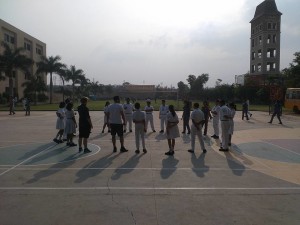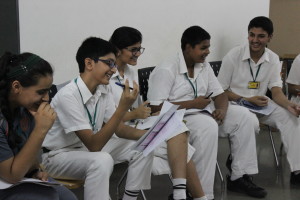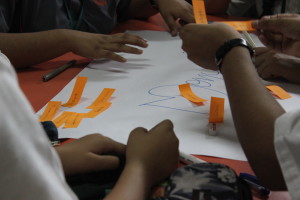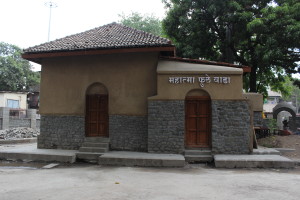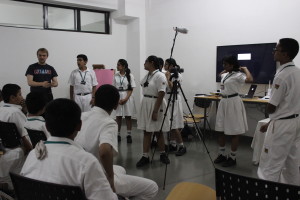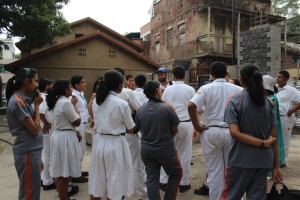The third Memory Walk in India was conducted by Aaron Peterer and Yan Paul Dubbelman at Delhi Public School, Pune from 17-19 April 2018.
We had a (large!) group of 19 secondary school students, each with their own opinions and very strong convictions. We began the workshop with introductions—in a circle, on the basketball court—accompanied by dance moves, which of course, led to much laughter. This was followed by an exercise where the students paired up and interviewed each other. The questions were simple and straightforward, designed to hone interview techniques and consequently through the sharing process, get to know one another better.
The three monuments that had been chosen were the War Memorial, Southern Command; Mahatma Phule Wada and the Aga Khan Palace. Prior to going out to see the monuments, the students worked on putting down three words that they associated with the word ‘monument’ and then, in groups placing the words under categories. They also watched a short film on Anne Frank and a PowerPoint presentation on different kinds of monuments from around the world. Aaron showed them photographs of the monument commemorating the book burning of 1933 in Berlin, the Missing House and others, including one for LGBTQ rights. All of them commemorate different events and causes and also look very different. The students discussed each of the photographs, the significance and the possible reasons for commemoration.
Day two- the day of filming began with the students dividing into groups after a discussion on what they had seen the previous day and choosing the monuments they would work on. They chose Mahatma Phule wada and the War Memorial. Mahatma Phule Wada is the house where social reformers Jyotirao and Savitribai Phule used to live, now converted into a museum. The Phule’s belonged to the Mali caste and were Dalits. They fought all their lives for reform and equal rights and set up a school for girls. The well inside the compound was set up so that anyone could drink water. The War Memorial was set up after the Kargil war by the citizens of Pune, commemorating martyrs from the state. After Paul had explained how to use the equipment and the methods for conducting the interviews, we set out to the sites.
Immediately we noticed that although the students working on the Mahatma Phule Wada had put down a question on Dalits, they simply refused to ask it, citing the ‘sensitive’ nature of the word. The state has only recently recovered from the fallouts of the riots at Bhima-Koregaon and the students said that they had been told not to mention the word Dalit at the wada. We spoke to them, acknowledging the worry that they had, but also the fact that the question itself had been worded perfectly, with no cause for creating a problem. We also told them about why riots happen and how issues like Dalit rights need to be addressed and spoken about. We found that after a few interviews the students began asking the question and of course, there was no problem at all. The residents of the area themselves used the word Dalit in the answers. I think that these discussions, however brief do help change mindsets, whether within us, communities, or in the students we engage with.
Day three was spent putting together the films. After some last minute scramble, the two films were ready. The group viewed both the films and after a brief discussion spoke about what they learned from the workshop. Some of them spoke about how they learned to conduct interviews and use Final Cut Pro. Some spoke about how people perceive monuments in different ways and that it is important to listen to different opinions.
From the three days that we spent with the students I found that many of them were approaching concepts of identity, memory and patriotism from a very fixed perspective. While working on the introduction for the film on the War Memorial, I chatted with some of the students in the group. I asked them a simple question: what do they know about atrocities committed by the Indian army. At first, there was stoic silence. Then one or two of them mentioned Jammu and Kashmir. When I asked what about Jammu and Kashmir, they did not elaborate. I think that these are conversations that need to be had, regardless of what one feels, or to what extent one feels about patriotism and nationalism.
It is important to listen, understand, acknowledge and discuss different opinions.
–Paroma Sengupta

